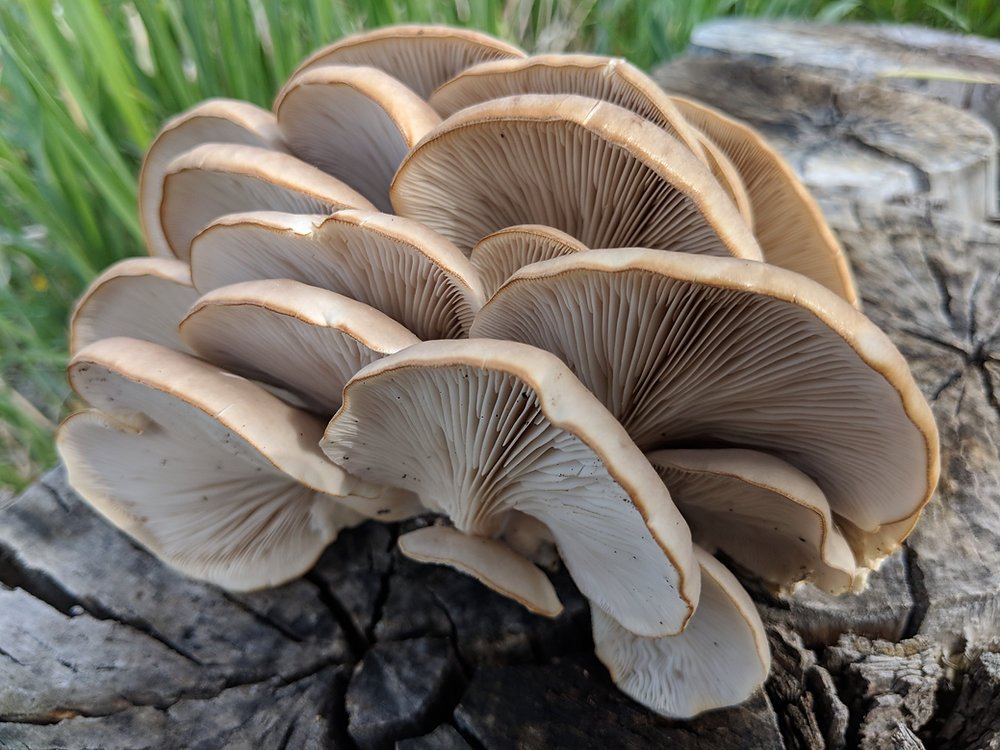By Ngalame Elias
As Cameroon intensifies efforts to achieve food security, inclusive growth and development, local communities are being encouraged to seize opportunities in agribusiness. In Tombel in South West Region of the country, a group of farmers is already reaping the benefits of agribusiness, growing oyster mushroom and supplying mushroom products in the local market.
The farmers belonging to MushFarm, a project initiated in 2020, are making use of recycled forestry and agricultural waste to grow the soilless crop. The project started off with 25 farmers has since seen grown its membership to over 500. “We mix maize cobs with materials such as bran and wheat flour to make the subsrate and apply fungicide to prevent fungus,” said Brice Nono Djomo, one of the farmers. Once the mixture is made, this substrate is sterilised, placed in barrels and heated over a wood fire. It is then cooled and distributed in bags. After the seed has been introduced, the bags are placed in the mushroom house. It takes 30 days for the first plants to appear.
“Thousands of oyster mushrooms are grown in dark rooms by members of our group. They are grown in rows on shelves on agricultural waste packaged in plastic bags,” said Nkwelle Jacob, the team leader. With financial support from the Tombel Farmers Cooperative, MushFarm has trained over 400 youths in mushroom farming. “Since training, mushroom farming has become a source
of employment for all these young people and women. We are calling on the government to give us more support so the cultivation of mushroom can be scaled,” Nkwelle said.
The project has since encouraged many youths to develop interest in mushroom cultivation as a cash crop that provides income for their livelihood. Dione Joan, a resident Tombel, said mushroom growing has been a major source of income and livelihood for his family in the past three years. Eighty-five percent of the mushroom produced is dried and packaged to reap better profit for the farmers. The farmers have seen growth in the market for their products, especially among people incorporate mushrooms in their meals for medical reasons.
“There are those who have been asked to stay off meat for health reasons, those who are healthy lifestyle enthusiasts that believe in healthy options and even those who are vegetarians or vegans looking for a trusted source for mushrooms, all year round,” said Nkwelle. A kilo of mushroom is sold for 2,000 CFA francs (3 euros) in Tombel, while it costs up to 3,500 in bigger cities like Yaoundé, the administrative capital, or Douala, the economic capital.
The duration of cultivation is three months. Each farmer in the group produces between 300 to 400 kilos of mushrooms, 80 percent of which are sold directly to consumers.
The group saw a surge in demand for mushrooms in the country especially during the Covid period, a factor that motivated many youths to take interest in its cultivation in their area.
“The demand for mushroom suddenly increased since the Covid period and since then we have a steady market for this important crop throughout the country,” Nkwelle said. Experts say mushroom is rich in proteins and vitamins B2, B3, B5 and D. Mushroom is also used to make oil for hair dressing, soap, juice and whisky.
“It softens the hair and makes it grow back. It also treats dandruff and hair breakage,” said Josiane Sogo, a beauty salon owner in Yaounde. Experts say though Cameroon has a ready market for mushrooms, more research, sensitisation, and training of manpower are required to enhance commercialisation and youth engagement in agribusiness especially in the rural areas. “Cameroon farmers need to go beyond the use of rudimentary tools and equipment to carry out innovations in production and processing of mushroom.
More training and research is needed in many parts of Cameroon when it comes to mushroom production,” said Ngu Nenong, the head of research in the Ministry of Agriculture. Reports indicate that the demand for edible and medicinal mushroom in Cameroon presently exceeds supply due to low production, lack of trained personnel in mushroom biotechnology and poor postharvest storage. “The government plans to put in more effort in training youths in mushroom cultivation,” Ngu said.

